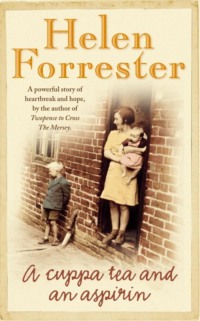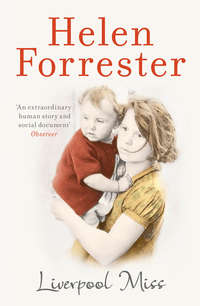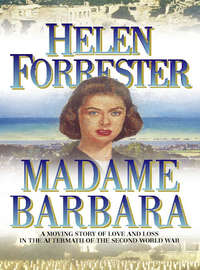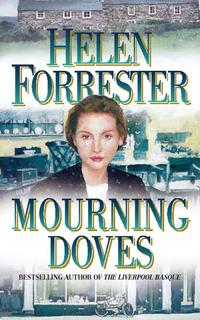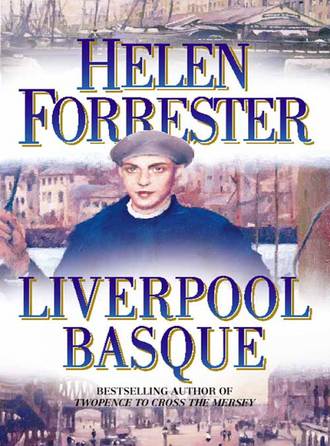
Полная версия
The Liverpool Basque
He would always tease her by replying that Basques had been pounded by rain in their native mountains for at least five thousand years, and they were immune to it.
He slowly heaved off his Wellington boots and laid them neatly in a boot tray. Like many men who had been to sea, he was extraordinarily neat, because he was used to making the most of the tiny space of a ship’s cabin.
In his thick white socks, he padded into the kitchen to find something to eat for lunch. He slapped a cheese sandwich together and then plugged in the kettle to make some instant coffee, and looked forward to the nap he always took after the midday meal.
As he put his plate and coffee mug down on the kitchen table and pulled out a chair, he asked himself ruefully, ‘Manuel, my lad, what have you come to, when all you look forward to is having a nap?’
The answer was a resigned shrug of one thin shoulder; he had sensed lately that his time was running out.
He decided that after he had slept a little, he would ring up his friend, Jack Audley, and suggest that he should come over for a game of pool on the billiard table in the basement family room. Jack was twelve years younger than he was, but they shared a common interest in fishing and ships – Jack had been a merchant seaman, too.
To help him get through his days without Kathleen, Manuel structured them as meticulously as he could, so that all the necessary domestic tasks and the garden were attended to. Sometimes, however, a thoroughly wet day upset the schedule.
If Jack was not at home, he thought, he would write to his young Liverpool cousin, Ramon Barinèta. He had already, on the first of the month, written to his oldest and dearest friend, Arnador Ganivet, another Liverpool Basque, who had been a Professor at the University of Liverpool, and he smiled gently at the recollection. Between himself and Arnador there was a frankness and concern for each other which probably exceeded that which might have been built up had they both spent their lives in Liverpool; the older they grew, the richer became the correspondence.
After supper each day, he added a page or two to the memoirs of his early life, which he was writing for the benefit of his granddaughter Lorilyn. He had a vague hope that, when she was older, she would read them and become interested in her Basque forebears. At times, her youthful scorn at his pride in his ancestry had hurt him so much that he longed to slap her; her ignorance of the world and its people, despite thirteen years of education, was absolutely abysmal, he fulminated. In frustration, he took to buying her, for her birthdays, books on European and Asian history. As far as he could tell, she never read them; the books were put on the bookshelf in the McLaren family room, their dust-jackets unbesmirched by handling, their pages stiff from never having been turned.
He never quite gave up on her immutability, though he had long since done so in the case of her mother.
He had remarked to Faith’s Grade Six schoolteacher that the child seemed to have no interest in her family’s past or their customs. The schoolteacher, who was an immigrant from Scotland, had tried to comfort him by saying that first-generation Canadian children were often so busy trying to be like the other children that they tended to discard, as much as possible, any trace of their immigrant origin. ‘It’s your grandchildren who will be passionately interested in where they sprang from; they’ll feel more secure,’ she had assured him.
But now, in Lorilyn, he had a grandchild, and she never read any book that she did not have to for her university courses. And what was she proposing to study? Engineering, God save her! Not a decent womanly occupation, like nursing or teaching.
While strolling along the cliffs with Jack, one fine summer day, when the gorse was in riotous yellow bloom and the bees were humming like tiny dynamos, he had broached the subject of human roots.
He said, ‘You know, Jack, people move around too much. A lot of ’em never see another relation, even their grandparents. Come to that, they don’t see much of their mum and dad either, in some cases.’
‘You’re right.’
‘All they’ve got is kids the same age as themselves or television to set the pace. They’ve no idea that we’ve learned ways to endure bad times – cope with difficulties – take disappointments in our stride. And the first time things don’t go just right – well, they’re sunk.’
He paused to watch a small yacht trying to tack against the wind, and muttered irritably, ‘He’ll drown if he don’t watch out.’ Then, picking up the original subject again, he went on, ‘There’s nothing much to make kids feel safe, no standards, no customs. They get no religion even – our Lorilyn’s never seen the inside of a church since she were christened – and I wouldn’t like to offend her father by askin’ what she’s doing with that young man always hanging around her.’ He gave a barking laugh. Then he added, ‘There’s no family discipline – I wouldn’t like my grandfather to see her; he’d have made her toe the line a bit, and he’d have had the backing of everybody else. Sometimes I feel like a voice in the wilderness. Do you?’
Jack’s round red face wrinkled up in a wry grin. Before he answered, he stopped to strike a match and light his pipe, shielding it from the wind with his curved palms. Then, as the pipe glowed and they continued to walk, he nodded agreement. ‘I used to slam my kids when they needed it. It didn’t do much good, because I wasn’t around that much – the wife had to manage while I was at sea.’ He drew slowly on his pipe. Then he continued, ‘And things seemed to be changed almost every time I came home. Nobody else’s kids were going to church any more – so ours wouldn’t. Discipline in school went out, and drugs came in. Like you say, the kids went around in herds all the same age – and there were no cow hands to keep them in line. And God help a cop who boxed their ears for them. I knew what I wanted for my kids, but I didn’t have much luck putting it over.’
Manuel dropped his cigarette butt and ground it out with his heel. ‘Seems to me that when we were having Faith, nobody dared touch a child – even to bath the poor little bugger – unless they had read at least three books by experts! Kathleen had a row of books.’
Jack laughed. ‘Same with us. It was like learning to dance from books – as if we’d no ideas of our own. My mother never needed a book to tell her what to do, and we all grew up knowing what was right and what was wrong – even if we weren’t perfect. I wish my mother had been around when our lads were growing up.’ His red face under his straw hat was filled with pain.
Manuel could have kicked himself for bringing up the subject of children. He had, for the moment, forgotten what a bitter disappointment both Jack’s boys had been to him. They seemed to lack motivation and found it difficult to keep jobs – like homing pigeons, they came back from Vancouver every few months, to live on their father.
Jack was saying bitterly, ‘I wish I’d taken a shore job, so I could’ve been home more.’
‘It’s not your fault, Jack. I’m sure of it. It’s the way things are. They’re treated as kids for far too long. In the old days, by thirteen or fourteen, they would’ve been learning a trade under a weight of older men, who’d have kept them in line; and they’d have learned there’s a limit to what you can get away with.’
‘Jobs are different now. How many of them ever go to sea?’
Manuel snorted. ‘Maybe we should send the whole pack of them to sea for a bit,’ he suggested, trying to lift Jack’s spirits. ‘They’d either drown – or learn their responsibilities mighty fast.’
Unexpectedly, Jack chuckled. ‘They’d soon learn who’s boss.’
Manuel began to laugh. ‘Oh, aye, they would. It would be great to see some of the little bastards in a force ten gale, telling the Old Man they were as good as him – or arguing they had rights, while waves as high as the mast were coming at them!’
‘Mannie, they don’t know nothing about natural things, like waves.’
‘I wouldn’t put it past our Lorilyn to explain the physics of a breaking wave to me!’ responded Manuel.
This made Jack really laugh, as they plunked themselves down on a bench, two old men silhouetted against the rippling sea, which had taught them most of their skills with an iron discipline.
‘Are you glad you went to sea?’ asked Jack from behind a cloud of tobacco smoke.
‘Never dreamed of doing anything else. Not till I met Kathleen, that is; she’d got her eyes on a shore job for me. After we was married, she kept on her nursing and she put me through college, and I come out a marine architect. We had a good life – but I missed the sea.’
‘Humph. My dad was a fisherman, and he took me out to sea when I was nine or ten. I was wet and cold and seasick, but I felt I was a real man. At fourteen, I was a deck boy.’ He made the statement with pride, and then a grin flashed across his face, as he added, ‘I’d never heard of being a teenager; I was a lad learning to be a man under real men. Had some good laughs, though.’
‘Oh, aye. I were happy when I were a little kid, too, with me dad and me Uncle Leo coming and going from sea – and being took down to visit their ships, and listen to them grumble and laugh. And getting a bit of pie from the ship’s cook.’ He paused to light another cigarette, and then went on. ‘And in the house, there was me granny and grandpa to tell me stories. After me mam slapped me for being naughty, me gran would wipe me face – and explain why I got the slap!’ Both men were silent, as they smoked and contemplated the sea and the mountains before them. Then Manuel said in a puzzled way, ‘Our Lorilyn never seems to need a grandpa at all.’
While he recalled this rambling conversation with Jack, he took the handmade patchwork quilt off the bed and folded it carefully and laid it on a chair, and sighed. Though he had tried, he did not feel that he had been a very good grandfather – unlike his own grandfather, Juan Barinèta.
He sat down on the side of his bed, pulled a faded crocheted shawl out of the drawer of the bedside table, and slowly eased himself down on to the bed until he lay on his back. He paused for a moment, while every bone and muscle in his body flashed with sudden aches, then he laid the shawl over himself, clasped his hands over his chest and thankfully closed his eyes. In the moment between waking and sleeping, he remembered Kathleen upbraiding him for resting on top of the patchwork quilt. Although he was tired from a very scary wartime voyage, he had pulled her down on top of him. They had forgotten about keeping the bedspread pristine, while they spent until nightfall making love so satisfactorily that even now, nearly fifty years later, he remembered it with awe. Had he really been that strong? And she so responsive?
After her death, he had come across the old quilt folded away at the back of the linen closet. Still beautiful, its colours muted by many drycleanings, it had been like meeting an old friend again. In a way, it had comforted him for the emptiness of the other side of the bed.
He had returned to his ship on the day following his happy afternoon with Kathleen, and her letter telling him the news about her pregnancy with Faith caught up with him in Galveston, Texas.
He remembered how excited he had been about the child, overwhelmed by the divine mystery of its existence and the sense of responsibility that it had laid upon him.
He had shouted the news to the few members of the engine room crew who had not gone ashore, and they had congratulated him on his sexual prowess with explicit pithiness. His news broke the astonished silence which had seemed to grip them at other news they had received that morning. The Yanks had dropped an amazing bomb on the port of Hiroshima and blown the whole city and its inhabitants to bits. The city was known to most of the crew and they had found it hard to accept its death – even if it was supposed to shorten the war. It was a port – like Liverpool!
He had immediately scribbled a few lines to Kathleen, expressing his pure joy at her news. After she was dead, he had found the letter in her jewellery box; she had kept it all her life.
He had also written to his mother, Rosita Echaniz, in Liverpool, urging her to come on a visit as soon as the war was over, to see the babe as yet unborn.
He had hoped for more children, but Kathleen had been adamant about limiting their family. ‘How will we ever afford to send them to university?’ she had asked. ‘And if you go back to college after the war …?’
Manuel was still uncertain that he himself wanted to return to college, and had never considered that a real university might be within the reach of any child of his, so he had reluctantly said he did not know.
The family remained at one.
The rainstorm which had swept the Juan de Fuca Strait came to an end. The sudden quiet woke the old man from his nap. He rose stiffly and put the shawl which had been keeping him warm back into the bedside drawer. With an amused awareness of his own finickiness, he carefully replaced the bedspread on the bed.
When he phoned Jack Audley, Mrs Audley said he had gone to Vancouver for the day.
Before going to his old-fashioned roll-top desk to write to Ramon in Liverpool, he went into the kitchen and took down from a cupboard a bottle of wine, already opened. He poured a glass of it carefully, so as not to disturb the sediment at the bottom of the bottle. Then picking it up, he went to the window and stood idly twirling it in the light of the first rays of the sun to pierce the rain clouds.
Instead of his own long, gnarled fingers holding the stem of the glass, he saw, with unexpected clarity, his grandfather’s huge paw holding a wine glass under his nose, to savour a bottle of a new year’s crop smuggled into Liverpool from Bilbao.
Those early years in the safety of his grandfather’s great shadow had been good years, he thought wistfully. He remembered how the old man’s beard waggled when he laughed, and when his grandfather picked him up it was like being hugged by a friendly bear.
He took his glass of wine into his den, where he had a small desk piled with notes and exercise books. Above the desk hung a ship’s chronometer, put there, he had told Jack with a laugh, to remind him that his time was short.
He put his glass down on the desk, drew up a chair and sat down. With slightly trembling fingers, he sought for and found a well-thumbed school exercise book. In it lay the life of a Basque; in fact, the lives of many of them, set down in the hope that Lorilyn would, one day, be interested in some of the men and women who were the cause of her existence. Like many Canadians, she shared a Scottish origin, too; but not everybody in the world is Scottish, considered Manuel tartly. He wanted her to know that she had roots in the oldest culture in Europe, going far back beyond written history. He wanted her to preserve something of it within her own being.
So that she would understand, he wrote in English, in an old-fashioned, neatly sloping, cursive hand. He poured out to her, as best he could, the story of his childhood and what little wisdom he felt he had acquired in the long years of his life, especially during the time that he had been part of a Basque community; he did not feel that he had to include much of his life with Kathleen – Lorilyn understood Canadian life – and the finale of Kathleen’s existence was, in any case, too painful for him to write about.
It was dark by the time he had to stop because of fatigue and he had forgotten, for the moment, his intention of writing to Ramon. He leaned back in his chair to stretch himself. His eyes were watering and his shoulders ached from the concentrated effort he had been making.
When he looked again at what he had written, he wondered suddenly what lay behind his own boyhood memories. What was going on amongst the grown-ups, who surged in and out of his grandparents’ kitchen-living-room? Were they happy?
It took a minute or two for him to bring himself back from Wapping Dock in Liverpool, and when his mind was clear of it, he was left with an aching longing to go home to it, to shake Arnador’s hand once more and see Cousin Ramon, and speak Basque with both of them.
Although Faith will have a fit, if you suggest that you want to do such a long air journey, you could do it, he told himself. And perhaps you should, before it’s too late!
He grinned wickedly. This summer, he promised himself. And don’t tell Faith until it’s too late to cancel the flight.
Chapter Four
Ports from which men go to sea are matriarchal societies; it is women who are in charge. They have to have their babies without any support from their husbands; and they have to teach their sons, as well as their daughters, to behave and mind their manners. Father is not at home frequently enough to take a strap to a delinquent lad.
Manuel, aged eighty-four, was trying hard to explain to Lorilyn, aged nineteen, that, even before feminism was invented, some women ruled their families.
In our house, he scribbled, it was Grandma Micaela Barinèta who was the undisputed boss. She was my mother’s mother, a shrunken ball of energy, always clothed in black, a piece of knitting, with a cork on the end of the needles, usually tucked into the pocket of her black apron. Even to me, when I was only three or four years old and all grown-ups seemed very tall, she appeared too little to possibly be the mother of my two uncles, one of whom, Leo Barinèta, lived with us. Whenever they had done something of which she did not approve, she lashed out at them with her tongue and scared them into line. She would not tolerate any nonsense from me, either, though I was only a toddler; and I soon learned to sit quietly, while the priest droned through the Mass, or to run away and play if she was gossiping with a neighbour.
Of course, Grandpa Juan Barinèta, who no longer went to sea, believed that he ruled the three generations in the house. He certainly received first consideration from Grandma – and from my mother, Rosita Echaniz, who always seemed to be in league with Grandma. Nevertheless, it was the two women who collected the men’s earnings from them and the rents from the emigrant lodgers, and laid out the family income to the best of their joint abilities. They bargained in the market for food, decided when new clothes would be bought, purchased coal for the fires, and paid the rent each week; they put every penny they could into three old biscuit tins under Grandma’s bed, until a few shillings had been accumulated to put into Post Office savings accounts.
If I had been good on the day that Grandma decided to go to the post office, she let me accompany her, and I had the honour of licking the savings stamps, which she purchased from the postmistress to put into her savings books; I must have licked pages and pages of sixpenny stamps, as Grandma laid away money, first for a rainy day, then for clothes, especially boots for all the menfolk, and finally for education.
The Basque community, nestled by the dock road, was united in its belief in education for their children; and the whole family was determined that the second child, which Mother was expecting, and I, should both go to a good private day school, rather than to the local Catholic school. In this emphasis on their children’s future, they differed somewhat from their polyglot neighbours, who tended, simply, to be thankful if their children managed to grow to adulthood in noisy, polluted Liverpool, knowing enough reading and writing to get a job in the docks or as deckhands.
I grew accustomed to hearing my future discussed, over many a glass of cheap, smuggled wine, by Grandpa, Uncle Leo, and my father, Pedro Echaniz, when he was home. Words like ‘university’…‘doctor’…‘solicitor’ whizzed over my head, strange words rarely used in our street.
At the beginning of each voyage, Father arranged with his employers for Mother to receive part of his wages each week. This was called an allotment, and, together with Grandpa’s and Uncle Leo’s earnings, was used for living expenses.
Grandma gave back to the men a little pocket money for wine and tobacco, both discreetly brought into the country by Basque seamen lucky enough to be sailing to and from their homeland, Vizcaya, in Spain.
A meal isn’t complete without wine, my grandfather would often say. Smuggled wines were cheap, and, on the whole, the customs officers did not worry too much about collecting duty on a few bottles of our native wines, as long as its illicit importation was on a very small scale.
Though ours was a very united household, it was not a placid one. Argument, debate were the salt of life, and, in addition, there were all kinds of small vendettas within the Basque community. The community became a solid block, however, whenever it felt it had, as a group, been insulted. The supreme calumny was to be referred to as Spaniards! Such a blunder was frequently made by our cheerful, easygoing fellow Liverpudlians, especially the Irish, who seemed sorely lacking in a knowledge of Iberian history, and by English clerks behind official counters, who didn’t really care what we were.
Amongst the men gathered round our kitchen table for a smoke and a gossip, such an allegation produced a glowering animosity; they sputtered like half-lit sparklers, and muttered about the improbable origins of all the accursed Spaniards they had ever met. Many of them spoke Spanish as well as they did Basque, and they could be equally rude in both languages; even in English, the English of the back streets, they could be quite lurid. My knowledge of lively curses in all three languages began at an early age.
So, from the time I was big enough to be carried around on Grandpa’s or Uncle Leo’s shoulder, I learned that I was a Basque and to be proud of it. I learned to speak Basque first; it was the language which flowed around my small world of kitchen-living-room and bricklined backyard; I learned good Castilian from the Spanish priests of St Peter’s Church – they were frequently in and out of our homes, to counsel or console, their lean, dark figures the epitome of God’s authority over little boys. And I learned English from my playmates in the street.
Grandpa had a beard heavily streaked with grey. His head was bald, except for a thin ring of neatly clipped black hair. Most of his teeth were deep-stained by tobacco, but a missing one had been replaced by a gold tooth which flashed as he talked; I was fascinated by it and my first ambition was to have a flashing gold tooth for myself. He had gone to sea in the days of sailing ships, and was proud to say that he had several times breasted the storms of Cape Horn, a place of terror at the most southerly point of Chile, where many a ship was lost before the advent of the Panama Canal gave a safer entry to the Pacific Ocean. ‘They don’t know what seamanship is, nowadays,’ he would grumble testily to my father, when he told of his adventures in a steamer.
For many years now, Grandpa Barinèta had held the agency for Basque emigrants passing through Liverpool on their way to Nevada, Arizona, California and Washington. An Agent was essential to protect such travellers from exploitation in a strange port, where their language was not spoken. He saw that they were housed and fed, while they waited for their ship; he kept their luggage safe, and delivered them to the correct ship at the right time. It was his pride that, to his knowledge, he had never lost even a piece of luggage, never mind an emigrant.
Many of these people were lodged in our own house, which was a large eighteenth-century dwelling, and I was quite used to our home being suddenly filled with strangers, who equally suddenly vanished a few days later. Even as a little child, I sensed how touchingly thankful they were to be in the hands of a fellow Basque, who took care that they were not robbed or cheated by local rascals who made a living by preying on confused travellers trying to get to the New World; and I will never forget Grandpa’s slow smile of satisfaction when he could close his ledger after a boat sailed, and sink into his carving chair at the kitchen table to enjoy a quiet glass of wine with Grandma and Mother.





